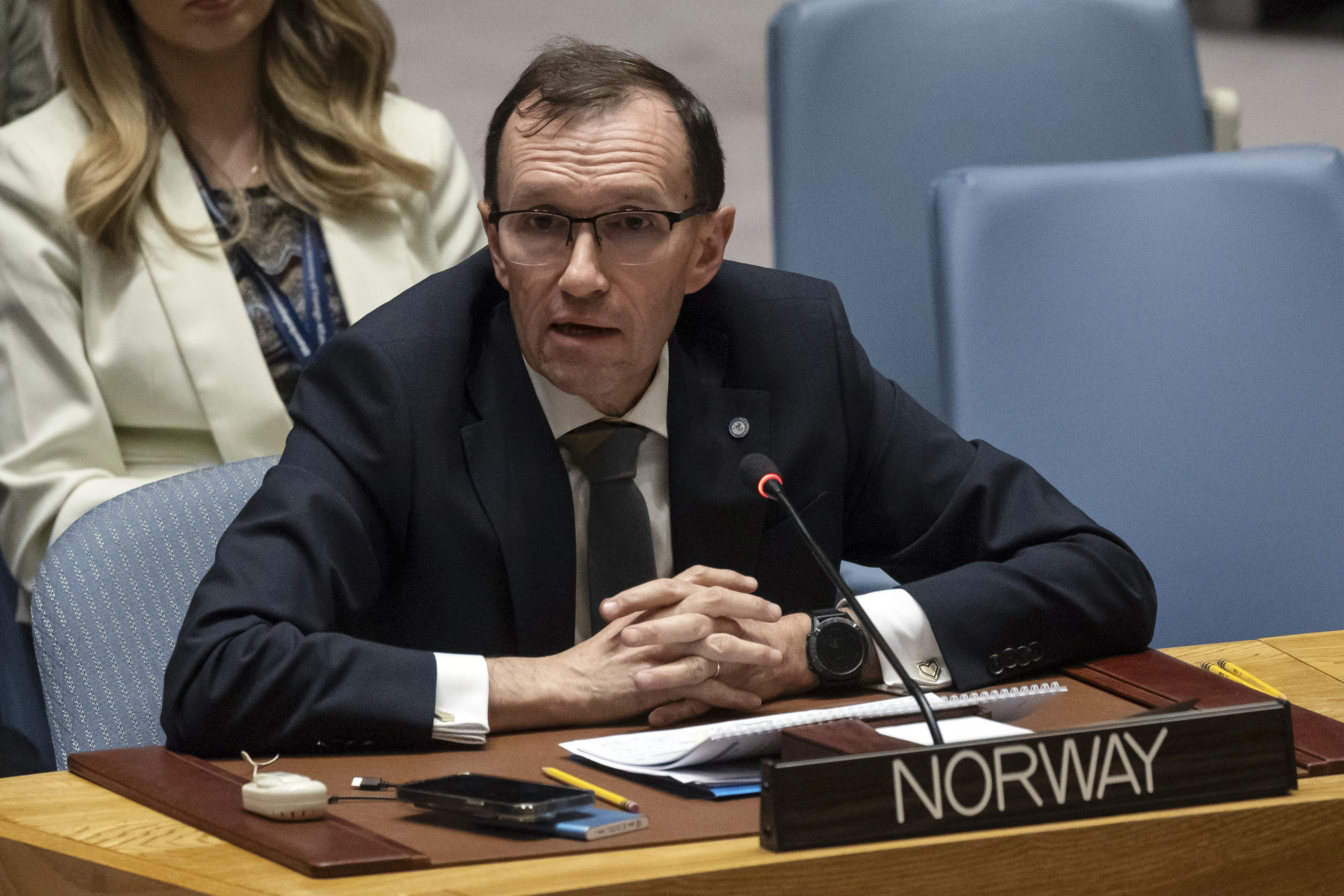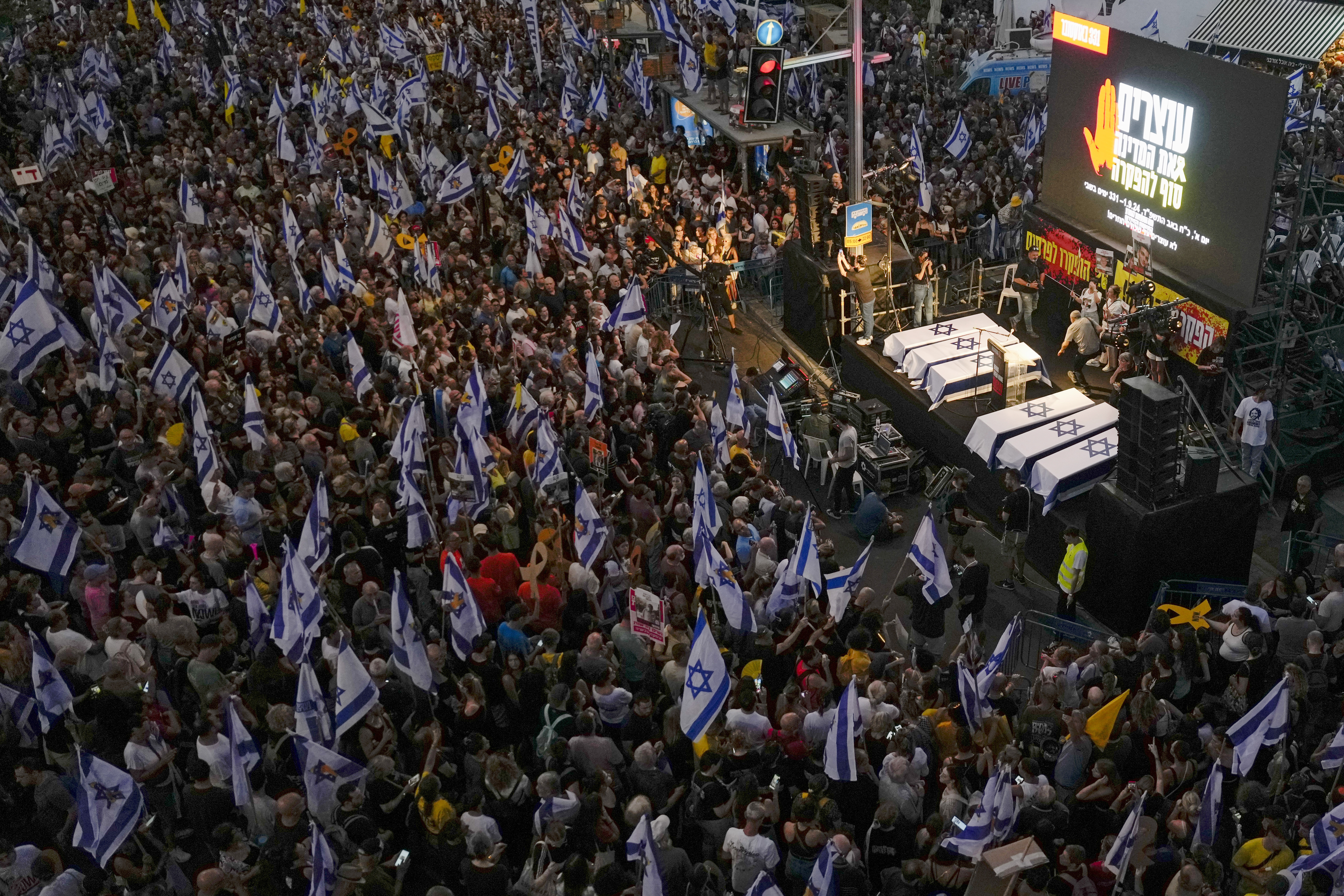
Ne’man Abu Jarad sat on a tarp on the ground. Around him, canvas sheets hung from cords, forming the walls of his tent. For the past year, Ne’man; his wife, Majida; and their six daughters have trekked the length of the Gaza Strip, trying to survive as Israeli forces wreaked destruction around them.
It's a far cry from their house in northern Gaza — a place of comforting routine, of love, affection and safety. A place where loved ones gathered around the kitchen table or on the roof on summer evenings amid the scent of roses and jasmine flowers.
“Your house is your homeland. Everything good in our life was the home," Ne'man said. “Everything in it, whether physical or intangible -- family, neighbors, my siblings who were all around me.
"We are missing all that.”
Get top local stories in San Diego delivered to you every morning. >Sign up for NBC San Diego's News Headlines newsletter.
US & World
The Abu Jarad family lost that stability when Israel launched its campaign in Gaza in retaliation for Hamas’ Oct. 7 attack.
They did exactly as the Israelis ordered in the devastating weeks and months of war that followed. They obeyed evacuation calls. They moved where the military told them to move. Seven times they fled, and each time, their lives became more unrecognizable to them, crowding with strangers in a school classroom, searching for water in a vast tent camp or sleeping on the street.
The Associated Press traced the family's journey as they were driven from their home. Israel's campaign has displaced nearly the entire population of Gaza — 1.9 million of its 2.3 million Palestinians — and killed more than 41,600 people, according to the Gaza Health Ministry. Like the Abu Jarads, most families have been uprooted multiple times.
For this family, the journey has taken them from a comfortable middle-class life to ruin.
Before the war: A cozy life
Living at the northernmost end of Gaza, most days before the war in Beit Hanoun were simple. Ne’man headed out each morning to work as a taxi driver. Majida got their daughters off to school. Their youngest, Lana, had started first grade. Hoda, the 18-year-old, was in her first year at university. The eldest, Balsam, just had her first baby.
Majida spent much of her day doing housework — her face lights up when she talks about her kitchen, the center of family life.
Ne’man had planted the garden with a grapevine and covered the roof with potted flowers. Watering them in the evenings was a soothing ritual. Then, the family and neighbors would sit on the front stoop or the roof to chat.
“The area would always smell nice,” he said. “People would say we have perfume because of how beautiful the flowers are.”
Oct. 7: The attack
On the morning of Oct. 7, the family heard Hamas rockets firing and news of the militants’ attack into southern Israel, in which some 1,200 people were killed and 250 kidnapped.
The Abu Jarads knew that the Israeli response would be swift and that their house, only about 2 kilometers (1.2 miles) from the border fence with Israel, would be on the front line.
By 9 a.m., Ne’man and Majida, their six daughters, and Ne’man’s sister packed up what they could and fled, as the Israeli military issued one of its first evacuation orders.
“It makes no sense to be stubborn and stay,” Majida said. “It is not about one person. I am part of a family and have girls.”
Oct. 7-13: Staying with Majida's parents
Like many, the family tried, at first, to stay close to home. They went to stay with Majida’s parents, in Beit Lahiya about a kilometer (.6 miles) away.
“The place was very comfortable, to be honest. I felt like I was at home," Majida said. "But we were living in fear and terror.”
Already, Beit Lahiya was being heavily bombarded. Over the six days they were there, at least nine Israeli strikes hit the town, killing dozens, according to the conflict monitor Airwars. Entire families were killed or wounded under the rubble of their homes.
As the explosions got closer, shrapnel pierced water tanks at Majida's parents' home. Windows shattered as the family huddled inside.
It was time to move again.
In the News
Oct. 13-15: Refuge at a hospital
When they arrived at al-Quds hospital, the family saw for the first time the scale of displacement.
The building and its grounds were packed with thousands of people. All around northern Gaza, families took refuge in hospitals, hoping they'd be safe.
The family found a small space on the floor, barely enough room to spread their blanket amid the frantic medical staff struggling with the wounded.
It was a black night and there were strikes, Majida remembers. “The martyrs and wounded were strewn on the floor," she said.
The day after they arrived, a strike smashed into a house a few hundred meters away, killing a prominent doctor and some two dozen members of his family, many of them children.
The Israeli military ordered all civilians to leave northern Gaza, setting in motion a wave of hundreds of thousands of people heading south across Wadi Gaza, the stream and wetlands that divide the north from the rest of the strip.
The family joined the exodus.
Oct. 15-Dec. 26: A cramped school
The family walked 10 kilometers (6 miles) until they reached the U.N.-run Girls’ Preparatory School in the Nuseirat refugee camp.
Every classroom and corridor was packed with families from the north. Majida, the daughters and Ne’man’s sister found a tiny space in a classroom already housing more than 100 women and children. For privacy in the cramped conditions, Ne’man moved in with the men in tents outside, in the schoolyard.
This was their home for more than 10 weeks. Majida and the girls slept curled up on the floor, without enough space even to extend their legs. As winter set in, there weren’t enough blankets.
The bathrooms were the worst part, Majida said. Only a few toilets served thousands of people. Getting a shower was a miracle, she said. People went weeks unable to bathe. Skin diseases ran rampant.
Every day, the daughters went at dawn to wait in line at the few bakeries still working and came back in the afternoon, sometimes with only one flatbread. One day, Ne’man and his daughters walked 5 kilometers (3 miles) to the town of Deir al-Balah, looking for drinkable water.
“If it wasn’t for the kind people in Deir al-Balah who took pity on us and gave us half a gallon, we could have returned with nothing,” Ne’man said.
As strikes continued, the family decided to go as far as possible, trekking 20 kilometers (12 miles) to Rafah, at Gaza’s southernmost end.
Dec. 26-May 14: Life in a tent
The Abu Jarads weren’t the only ones: As Israeli evacuation orders ate away at more and more of Gaza, nearly half of the population crammed into Rafah.
Here, the family had their first taste of living in a tent.
They set up amid the massive sprawl of tens of thousands of tents on Rafah’s outskirts, near U.N. aid warehouses known as "the barracks.”
“In the winter, it was hell, water drenched us," Majida said. "We slept on the ground, nothing under us, and no covers.”
They had no money to buy food in the markets, where prices soared. The youngest girls got sick with colds and diarrhea, and there was no nearby pharmacy to buy medicine. The family survived completely off U.N. handouts of flour and other basics.
“To buy one tomato or cucumber and find it in the tent was like a dream,” Ne’man said.
Like so many others, they'd believed Rafah was the last safe place in Gaza.
It was not.
In the first week of May, Israel ordered the evacuation of all of Rafah. Then its troops pushed into the city. Bombardment intensified.
Ne’man and Majida tried to stay as long as possible. But an airstrike hit nearby, he said, killing four of Ne’man’s cousins and a young girl.
May 16-Aug. 16: “Humanitarian zone”
Palestinians who'd packed into Rafah — more than 1 million — all streamed out again, fleeing the Israeli offensive.
They scattered across southern and central Gaza. New tent cities filled beaches, fields, empty lots, schoolyards, cemeteries, even dumpsites – any open space.
The Abu Jarads moved by foot and donkey cart until they reached a former amusement park known as Asdaa City. Now its Ferris wheel stood above a landscape of tents stretching as far as the eye could see.
Here, in Muwasi, a barren area of dunes and fields along the coast, Israel had declared a “humanitarian zone” – though there was little aid, food or water.
Every amenity once taken for granted was a distant memory. Now the kitchen was a pile of sticks for kindling and two rocks for setting a pot over the fire. No shower, only the occasional bucket of water. Soap was too expensive. Only a draped sheet separated them from their neighbors. Everything was filthy and sandy. Large spiders, cockroaches and other insects crept into the tent.
Aug. 16-26: Fleeing to the sea
Even the “humanitarian zone” was unsafe.
A raid by Israeli troops less than a kilometer (half-mile) away forced Majida and Ne’man to uproot their family once more. They headed toward the Mediterranean coast, not knowing where they'd stay.
Fortunately, they said, they found some acquaintances.
“God bless them, they opened their tent for us and let us live with them for 10 days,” Ne’man said.
Late August: Moving again, no end in sight
When they returned to Muwasi, the Abu Jarads found their tent had been robbed – their food and clothes, all gone.
Since then, the weeks blur together. The family finds survival itself loses meaning in a conflict that seems to have no end.
Food has become even harder to find as supplies entering Gaza drop to their lowest levels of the war.
Israeli drones buzz overhead constantly. The mental strain wears on everyone.
One day, Ne’man said, his youngest daughter, Lana, told him, “You stopped loving me. Because now when I come near you, you say you are fed up and tell me to stay away.”
He kept telling her, “No, darling, I love you. I just can’t bear it all.”
They all dream of home. Ne’man said he learned that his brother’s house next door was destroyed in a strike, and his own home was damaged. He wonders about his flowers. He hopes they survived — even if the house is gone.
The difference between then and now, Majida said, is “the difference between heaven and earth."
Far from the warmth and affection of home, the Abu Jarads feel themselves surrendering to despair.
“We are jealous," Majida said. "Jealous of who? Of the people who were killed. Because they found relief while we are still suffering, living horrors, torture and heartbreak.”
___
AP writers Julia Frankel in Jerusalem and Lee Keath in Cairo contributed to this report.







